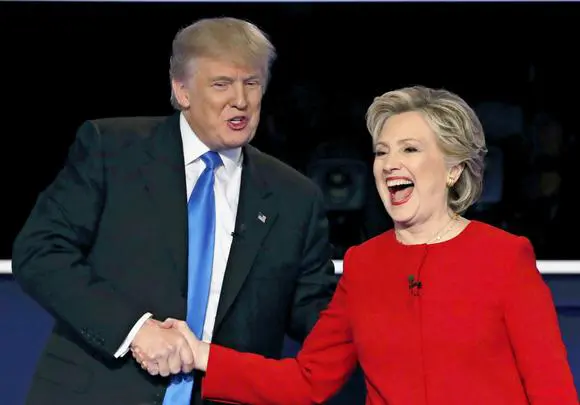Many U.S. media outlets judged that Democratic nominee Hillary Clinton outperformed rival Donald Trump during the first U.S. presidential debate on Sept. 26. But the televised battle turned out to have little impact on the post-debate approval ratings for both candidates.
Interestingly, Japan was a key topic of discussion during the 90-minute showdown.
Clinton brought up Japan first. She said her Republican opponent "has said repeatedly that he didn't care if other nations got nuclear weapons -- Japan, South Korea, even Saudi Arabia." Clinton called for a stronger alliance with Japan instead.
She appeared to be trying to stress that Trump is "totally unqualified" to be the president of the United States, who also serves as the commander in chief of the country's armed forces and is responsible for launching nuclear weapons.
Trump argued that the U.S. allies "do not pay us" for being defended by the U.S. "We can't defend Japan, a behemoth, selling us cars by the million," he also said.
Trump referred to Japan four times during the debate, while Clinton did so twice.
It is unusual for the Asian country to be highlighted in a presidential debate. Even in the 1980s, when trade disputes between the U.S. and Japan escalated, presidential candidates hardly referred to Japan during debates. To be exact, Japan was mentioned once by Republican Ronald Reagan in 1980, and once by Democrat Walter Mondale in 1984.
It has been said that foreign policy does not affect voters. If that is true, why are Clinton and Trump so concerned about Japan? One possible explanation is that they are using "Japan" as a code word to appeal to certain voters.
Not about foreign policy
A week before the first debate, Clinton met withJapanese Prime Minister Shinzo Abe in New York for one-on-one talks on the sidelines of the U.N. General Assembly meeting and reaffirmed her desire to strengthen the alliance between the two countries. Although the topic was not a new one, Clinton had reason to showcase the meeting with Abe.
She was probably trying to show voters and Japanese companies in the U.S., particularly in the state of Ohio, that Japan is on her side, not Trump's.
Many Japanese companies have operations in Ohi.The Midwestern state is also known as a critical electoral swing state, and the votes of employees at Japanese companies could be enough to affect the election results. Clinton seemed to be trying to make the most of the talks and the debate as an opportunity to gain support from these voters.
Those who work for Japanese businesses in the U.S. are mostly Americans. Trump used to condemn Japan for taking jobs from Americans, but he appears to have learned that this claim does not make sense.
The Republican nominee is instead carefully reaching out to Japan behind the scenes. Michael Flynn, a retired U.S. Army lieutenant general and former head of the Defense Intelligence Agency, plans to visit Japan in mid-October. As Trump's foreign policy and military adviser, Flynn is reportedly arranging to speak with top Japanese government officials and lawmakers about topics including Trump's agenda in Asia.
The second round of the presidential debates is scheduled for Sunday. Trump, speaking of his opponent, suggested he could "hit her harder." Clinton may have to deal with stronger language from Trump this time, after he held back in the first debate.
With about a month to go before the Nov. 8 election, the battle to win over voters is intensifying.
(Nikkie)
 简体中文
简体中文

